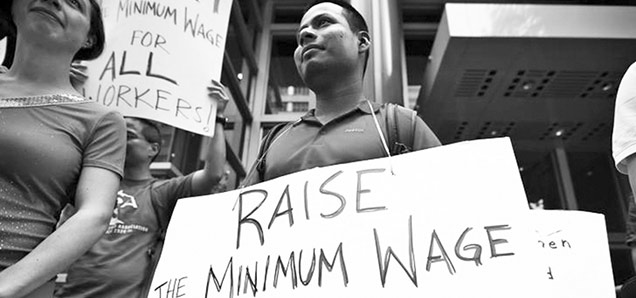The bare minimum wage
 CREDIT: HARVARDPOLITICS.COM
CREDIT: HARVARDPOLITICS.COMThe minimum wage debate rages on.
Chris Rock used to tell a joke about working at Burger King for minimum wage. He said that working for minimum wage was like having a manager come up to you and saying, “Hey if I could pay you less, I would, but it's against the law.”
Almost every student has dealt with working for minimum wage at some point in their life and knows that the jobs are often thankless and the money never seems to add up.
Ontario's minimum wage is a hotly contested issue for the province as the rate has been unchanged since reaching $10.25/hour almost four years ago. Prior to 2006, when the government caved to public pressure, the minimum wage had increased just over a dollar in a 10-year span. In similar fashion, The Campaign to Raise the Minimum Wage was founded to raise awareness about the stagnancy of the minimum wage. The campaign has been an umbrella for several advocacy groups who believe that the minimum wage should increase to $14/hour to provide an adequate quality of life for more Canadians.
Ontario Premier Kathleen Wynne has promised to raise the minimum wage to $11/hour on June 1 and tie it to the rate of inflation going forward. The NDP is showing support for raising the minimum wage as well, applauding the premier's actions and calling for a commitment to reaching $12/hour by 2016. The inflationary increase method would achieve a similar rate just one year later because both the NDP and Liberal parties know that excessive tampering with the minimum wage structure could be catastrophic for the provincial economy. Unsurprisingly, the Ontario PC Party has said little on the subject, the last PC Premier of Ontario raised the minimum wage just 75 cents during his seven years in office.
The two approaches to minimum wage are rooted in differing ideologies, but research has failed to provide empirical evidence supporting one or the other. The conservative ideology is that if companies have to pay their employees more, they can't spend as much money growing their business. In theory, if a company didn't have to pay each employee as much, they could afford to hire more employees. The Liberal mindset is that if minimum wage were to be increased, the average person would spend more money and the increase in business would counter the increase in wages. Both theories are deeply flawed but represent two different economic models that the respective right and left are trying to champion.
The announcement of an increase to the minimum wage comes at a time when the incumbent Liberal party is particularly vulnerable to public pressure. The provincial budget is imminent and Wynne wants to bank as many votes as possible ahead of what will almost certainly be a non-confidence vote leading to an election. Wynne is drawing a line in the sand for Ontarians to choose whether they want a government that uses the economy to help people or one that uses people to help the economy.
Editorial opinions or comments expressed in this online edition of Interrobang newspaper reflect the views of the writer and are not those of the Interrobang or the Fanshawe Student Union. The Interrobang is published weekly by the Fanshawe Student Union at 1001 Fanshawe College Blvd., P.O. Box 7005, London, Ontario, N5Y 5R6 and distributed through the Fanshawe College community. Letters to the editor are welcome. All letters are subject to editing and should be emailed. All letters must be accompanied by contact information. Letters can also be submitted online by clicking here.













